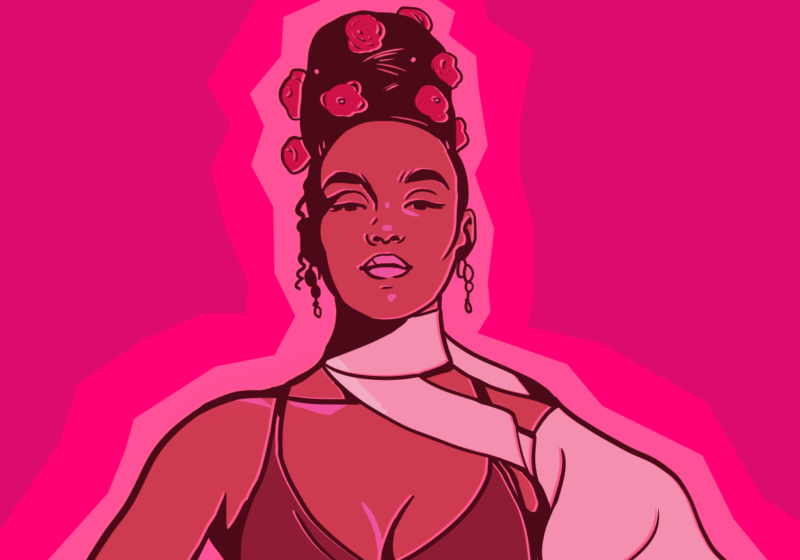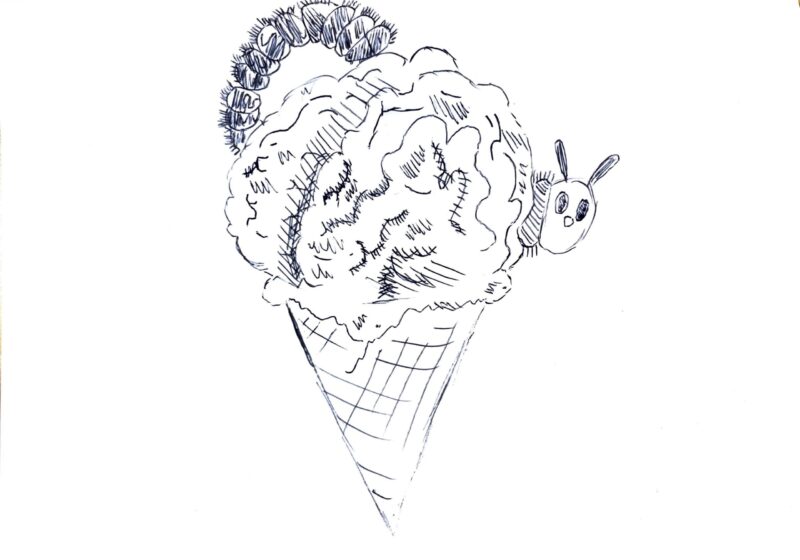Last Monday, the typically black office chairs in the Humanities Center were stitched with sayings like “here to stay,” “evolve your mind,” “let’s be angry,” and “we are here” in colorful thread. The room was ready for a presentation by Omise’eke Natasha Tinsely.
Tinsely, a professor of African American studies at USC Santa Barbara, visited UR for her lecture “Janelle Monae, Janet Mock, and Black Femme-inist Futures.” It was her first trip away from California since moving there, and she took to the podium in a floral print dress and large statement earrings that said “BLACK” in wood lettering.
“You might think I wore these for the sake of my presentation,” she said, “but this is all I have in my closet.”
Tinsely, who teaches classes with titles like “Beyonce and Feminism” and “Rihanna and Womanism,” was trained as a literary critic. She went to graduate school in the ‘90s as a queer studies student, which, she said, “was too political but also not political enough.” She also found that the program didn’t do justice to the black experience. “Scholarship was shifting from literature to pop culture, so that’s where my studies were going, too.” Now, as a mother and a professor, she said she’s still finding herself in the era of Trump.
Tinsley was an easygoing speaker, but her speech itself was compact and literary. “Femme is everywhere,” she said, “in ways you like it and ways you don’t.” For those who don’t know, Monae and Mock are both prominent black female artists who, according to Tinsely, set their artistic revolutions into motion at the 2017 Women’s March.
“We’re all women,” she said with pussy hats — the pink knitted article worn by many at the 2017 Woman’s March — projected onto the screen behind her. “But how do race and sexuality come together?”
The makers of the pussy hat wanted to reclaim the derogatory term, Tinsley said, but in doing so they overlooked entire sectors of the female population.
Wearing a pussy hat in the wake of Trump’s inauguration meant, Tinsley said, that in order to be a woman, one had to have a light-skinned vagina. (“I use this word [pussy] quite a lot,” Tinsley added. “My husband thinks it’s unseemly, but it is what it is.”)
The pussy hat was a symbol of privileged solidarity, Tinsley said, one that didn’t reach marginalized feminists. In protest, musician Monae and Mock both gave speeches of retaliation at the Women’s March dressed, comparatively, in all black.
Monae released the music video to her song “Pynk” in 2018, as a part of her album “Dirty Computer.” This was Tinsley’s first example of “black femme-inism.” She broke down the structure of the video, from the pink swatches of desert sand to the vagina-esque pants Monae and the other women wear while they dance.
The video, Tinsley said, is filled with feminine symbolism and mysticism — women driving in a pink car, sipping milkshakes in a pink rest stop, lounging by an empty swimming pool, doing aerobics with their legs intertwined. There are also grapefruits, kittens, and a finger going through the hole of a doughnut.
But Monae never outwardly uses any sexual words or innuendos. The opening lyrics of the song are “pink like the inside of your … baby,” and Monae emphasizes the missing word by dancing with her hands near her crotch while she wears her pink billowing pants. She then dances on the shoulder of her real-life partner, Tessa Thompson, with Thompson’s head appearing between her legs. Later, the lines “pink like the lips around your,” “pink like your fingers in my,” and “pink like the skin that’s under … baby” are sung. In subsequent interviews, she posed the counterpoint that the pants are not, in fact, supposed to be shaped like genitalia.
“When this video was released my daughter was eight,” Tinsley said. “And she said, ‘do people really think those pants look like vaginas?’”
The same year, Janet Mock directed an episode of “Pose,” a drama series about the life and society of queer people of color in New York City in the ‘80s. “Love is the Message,”the sixth episode of the first season, was Mock’s directoral debut, and, shortly after, she became the first transgender woman to sign a deal with a major studio.
Tinsley played a few minutes of the episode, in which a white woman, Patty, confronts a black transgender woman, Angel, about her affair with Patty’s husband, Stan. They sit in a diner and Angel’s pink dress is juxtaposed against the grimy windows of the diner. Angel says she only ever wanted to be kept, but once Stan had her, she felt like a doll that only came to life when Stan wanted to play. Patty feels the same way, but when Angel tells her that she’s a “transexual” Patty is shocked, demanding to see Angel’s penis.
“Everything I can’t have in this world is because of what I have down there,” Angel says. “If you really want to know who I am, that is the last place you should look.”
Tinsley concluded her speech with the assertion that there are many different styles of femme. “There’s a difference between performing femme and identifying as femme,” she said.
“I know nothing about Janelle Monae,” Tinsley said later. “I’m just writing about the character she presents to us.”
Editor’s Note (11/5/19): This article has been changed to clarify Tinsely’s meaning when she referred to “that word.” She was talking about the word “pussy,” which was not initially clear.





